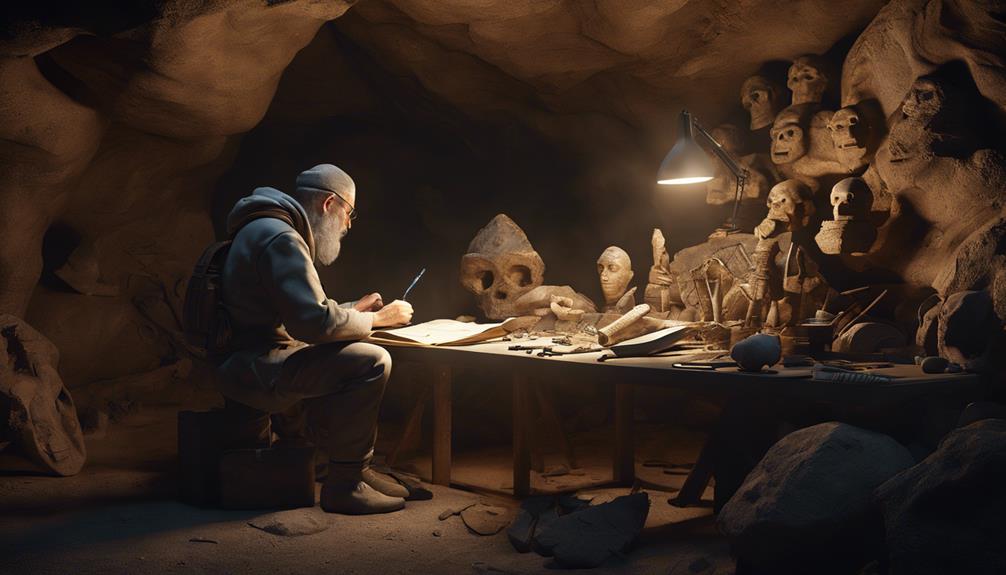Anthropologist Job Description
Anthropologists conduct ethnographic studies, employ fieldwork techniques, and analyze social structures to understand human behavior and cultures. They hold advanced degrees, gain practical experience, and stay updated with current trends in the field. Immersive fieldwork, data analysis, and cultural preservation are vital aspects of their work. Anthropologists collaborate with communities, analyze data meticulously, and contribute to the broader field of anthropology. Career opportunities span academia, government, non-profits, and the private sector. Effective communication, ethical considerations, and future outlook in anthropology showcase its evolving and impactful nature. This profession offers a dynamic and diverse landscape for those intrigued by human societies.
Key Takeaways
- Conduct ethnographic studies using diverse research methodologies.
- Analyze social structures and gather firsthand data in fieldwork.
- Hold a master's or doctoral degree for career advancement.
- Safeguard cultural heritage and promote preservation initiatives.
- Pursue opportunities in academia, government, non-profits, and private sectors.
Key Responsibilities
In understanding the role of an anthropologist, it is important to delineate the key responsibilities that define their professional practice. Anthropologists are tasked with employing various research methodologies, with a particular focus on ethnographic studies. These studies involve immersing themselves in the culture and daily lives of the communities they study. By utilizing fieldwork techniques such as participant observation and interviews, anthropologists gather firsthand data to analyze social structures, behaviors, and belief systems within a community.
Community engagement is an essential aspect of an anthropologist's responsibilities. They establish relationships with community members to gain trust and access essential information. This engagement facilitates a deeper understanding of the community's practices and traditions. Through these interactions, anthropologists can provide valuable insights that contribute to preserving cultural heritage and promoting cross-cultural understanding.
Educational Requirements
Having a strong academic background in social sciences or related fields is vital for individuals aspiring to pursue a career as an anthropologist. Anthropologists typically hold a master's or doctoral degree in anthropology or a related field such as sociology, archaeology, or cultural studies. Below is a table summarizing the educational requirements and opportunities for anthropologists:
| Degree Options | Practical Experience |
|---|---|
| – Bachelor's in Anthropology or related field | – Fieldwork experience |
| – Master's in Anthropology or related field | – Internships |
| – Ph.D. in Anthropology or related field | – Research projects |
In addition to formal education, gaining practical experience through fieldwork, internships, and research projects is essential for aspiring anthropologists. Certification requirements for anthropologists vary depending on the specialization and are not always mandatory, but they can enhance job prospects. Continuing education opportunities, such as attending conferences, workshops, and pursuing specialized courses, are valuable for staying updated with the latest trends and research in anthropology.
Fieldwork and Research
Anthropologists engage in immersive fieldwork and rigorous research to study and understand various aspects of human societies and cultures. Fieldwork presents anthropologists with a range of challenges, such as adapting to unfamiliar environments, establishing rapport with local communities, and maneuvering cultural sensitivities. These challenges require flexibility, patience, and cultural competence to overcome. Anthropologists employ diverse research methodologies during fieldwork, including participant observation, interviews, surveys, and archival research. Each methodology offers unique insights into the social structures, beliefs, and practices of the studied communities.
Participant observation, for instance, allows anthropologists to immerse themselves in the daily lives of the people they study, gaining firsthand experience and building trust over time. Interviews provide a platform for individuals to share their perspectives and stories, contributing to a richer understanding of cultural practices. Surveys offer quantitative data that complement qualitative findings, providing a more thorough analysis of social phenomena. Archival research explores into historical records and documents, offering valuable context for interpreting contemporary cultural practices. By combining these research methodologies, anthropologists can generate nuanced and holistic insights into the complexities of human societies.
Data Analysis
Utilizing advanced statistical techniques, anthropologists meticulously analyze collected data to uncover patterns and insights that shed light on the intricate dynamics of human societies and cultures. Statistical methods form the backbone of data analysis in anthropology, allowing researchers to quantitatively interpret the information gathered during fieldwork. By applying statistical tools, anthropologists can identify correlations, trends, and anomalies within their datasets, leading to a deeper understanding of social structures, behaviors, and cultural practices.
| Statistical Methods | Data Interpretation |
|---|---|
| Regression Analysis | Identifying trends and relationships among variables |
| Cluster Analysis | Grouping data points to reveal underlying patterns |
| Factor Analysis | Uncovering latent factors influencing cultural phenomena |
These statistical methods enable anthropologists to sift through vast amounts of data efficiently, drawing meaningful conclusions that contribute to the broader field of anthropology. Through meticulous data interpretation, anthropologists can offer valuable insights into the complexities of human societies and contribute to our understanding of cultural diversity and evolution.
Cultural Preservation
In light of the insights gleaned from data analysis, the importance of cultural preservation emerges as a pivotal aspect in the domain of anthropology. Cultural heritage, encompassing traditions, rituals, languages, and artifacts, holds a significant place in understanding societies' past and present. Anthropologists play a critical role in safeguarding and promoting cultural heritage through various means, with community engagement being central to these efforts.
Community engagement is essential for effective cultural preservation as it involves collaborating with local communities to understand their traditions, beliefs, and practices. By actively involving community members in preservation initiatives, anthropologists can guarantee that these efforts are respectful, inclusive, and sustainable. This engagement fosters a sense of ownership and pride within the community, strengthening their connection to their cultural heritage.
Moreover, community engagement allows anthropologists to gain valuable insights and perspectives from community members, enriching their understanding of the cultural practices being preserved. By working hand in hand with communities, anthropologists can make sure that cultural preservation efforts align with the needs and aspirations of the people whose heritage is being safeguarded.
Collaboration and Communication
Effective collaboration and communication are essential skills for anthropologists working in diverse research teams. Teamwork in research allows for the pooling of knowledge and skills to tackle complex anthropological questions.
Additionally, clear and concise communication during fieldwork is critical for building relationships with communities and obtaining accurate data.
Teamwork in Research
Teamwork plays a pivotal role in the field of anthropology, enhancing the depth and breadth of research through collaborative efforts and effective communication strategies. Research collaboration in anthropology involves diverse team dynamics that contribute to the richness of insights gained during fieldwork.
Team dynamics, such as shared goals and mutual respect among team members, are essential for successful research partnerships. In anthropology, the complexity of human societies and cultures requires interdisciplinary approaches, making teamwork indispensable for thorough understanding.
Fieldwork dynamics are influenced by how well team members collaborate, share responsibilities, and communicate findings. By fostering strong research partnerships and maintaining open lines of communication, anthropologists can navigate the challenges of fieldwork and produce nuanced and insightful research outcomes.
Effective Fieldwork Communication
Collaboration and communication dynamics are fundamental components of successful fieldwork endeavors in anthropology, facilitating the exchange of insights and the synthesis of diverse perspectives to enrich research outcomes.
Interpersonal dynamics play a critical role in maneuvering fieldwork challenges, allowing anthropologists to build trust and rapport with the communities they study.
Language barriers can present obstacles, emphasizing the importance of effective communication strategies such as utilizing interpreters or learning the local language.
Cultural immersion is essential for establishing meaningful connections and gaining a deeper understanding of the social context.
Career Opportunities
A diverse range of career opportunities awaits individuals pursuing a profession in anthropology. With a foundation in understanding human behavior, cultures, and societies, anthropologists can explore various career paths. In academia, opportunities exist for teaching and research, leading to career advancement through publications and academic recognition. Government agencies often seek anthropologists for roles in research, policy development, and cultural preservation. Non-profit organizations rely on anthropologists for community development, advocacy work, and program evaluation. In the private sector, anthropologists find roles in market research, user experience design, and organizational development.
When considering career opportunities in anthropology, individuals should be prepared for salary negotiations. Salaries can vary based on the specific field, level of experience, and geographical location. Those in academia may have different salary structures compared to those working in consulting or research positions. Understanding the market demand for anthropological skills and having the ability to articulate the value of anthropological expertise can be essential in negotiating competitive compensation packages.
Ethical Considerations
Ethical considerations are vital in the field of anthropology, with privacy protection being a core tenet. Anthropologists must navigate the delicate balance between gathering essential data and safeguarding the confidentiality of their subjects.
Additionally, cultural sensitivity is essential to ensuring that research respects the beliefs and practices of the communities being studied.
Privacy Protection
When considering the protection of privacy in anthropological research, it is essential to establish robust ethical frameworks that safeguard the confidentiality and dignity of individuals involved. Adhering to privacy regulations and guaranteeing data security are paramount in maintaining the trust and respect of research participants. Anthropologists must obtain informed consent, anonymize data whenever possible, and protect sensitive information from unauthorized access. Transparency regarding data collection methods and purposes is vital in upholding ethical standards. By prioritizing privacy protection, anthropologists demonstrate a commitment to upholding the integrity of their research and respecting the rights of those involved.
| Privacy Protection Guidelines | Description | Importance |
|---|---|---|
| Obtain Informed Consent | Seek permission from participants | Ensures respect for autonomy |
| Anonymize Data | Remove identifying information | Protects confidentiality |
| Secure Data Storage | Use encrypted systems | Prevents unauthorized access |
| Transparent Communication | Clearly explain research goals | Builds trust with participants |
Cultural Sensitivity
In the domain of anthropological research, maneuvering cultural sensitivity poses a significant ethical challenge that demands a nuanced understanding of diverse societal norms and values. Anthropologists engaging in cross-cultural communication must navigate the intricacies of different belief systems, languages, and social practices with finesse and respect.
Social awareness plays a pivotal role in ensuring that interactions are conducted ethically and with sensitivity towards the cultural perspectives of the individuals or communities being studied. This involves actively listening, observing, and interpreting behaviors within their cultural context without imposing external judgments or biases.
Future Outlook
The future outlook for anthropologists appears promising as the field continues to evolve and adapt to the demands of a rapidly changing world. Regarding the job market, anthropologists are increasingly sought after by a variety of sectors. From government agencies to non-profit organizations and even private corporations, the unique skill set possessed by anthropologists is becoming more recognized and valued. Additionally, technological advancements have opened up new avenues for research and data analysis, allowing anthropologists to explore deeper into understanding human behavior and societies.
Anthropologists are also making a global impact through their interdisciplinary studies. The ability to work across various fields such as sociology, psychology, and biology enables anthropologists to tackle complex global issues like climate change, migration, and healthcare disparities. This interdisciplinary approach not only enriches the field of anthropology but also contributes significantly to addressing pressing challenges faced by societies worldwide. As the world becomes increasingly interconnected, anthropologists play an important role in bridging cultural gaps and fostering mutual understanding.
Conclusion
To sum up, the anthropologist job description encompasses a wide range of responsibilities, from conducting fieldwork and research to analyzing data and preserving cultures. Collaboration and communication are key aspects of this profession, along with ethical considerations and a focus on cultural preservation.
The future outlook for anthropologists is promising, with various career opportunities available in academia, research institutions, and government agencies. Like a well-tuned orchestra, anthropologists harmonize diverse elements to understand and preserve the richness of human cultures.







